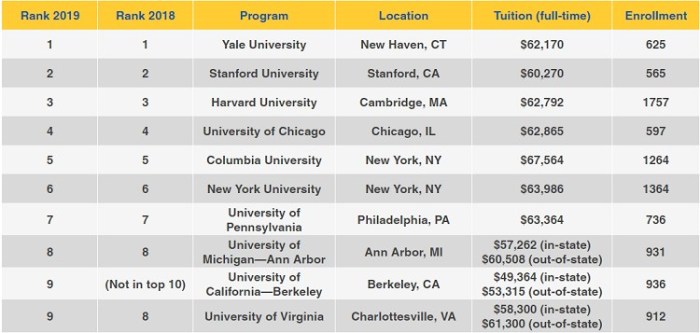Aspiring legal professionals, take note! Embark on a journey to discover the pinnacle of legal education. In this comprehensive guide, we unveil the best universities for law degrees, meticulously curated from esteemed sources like US News & World Report, Times Higher Education, and QS World University Rankings.
Prepare to delve into a world of academic excellence, where knowledge and opportunity converge to shape the future of law.
Our exploration begins with a thorough ranking of these esteemed institutions, based on rigorous metrics that measure their commitment to academic rigor and student success. From faculty-to-student ratios to acceptance rates and post-graduation employment rates, we leave no stone unturned in our quest to identify the crème de la crème of legal education.
Top-Ranked Universities

For aspiring legal professionals, selecting the right university for a law degree is crucial. Several reputable organizations, such as US News & World Report, Times Higher Education, and QS World University Rankings, provide rankings of the best universities for law degrees based on various criteria.
These rankings consider key metrics like faculty-to-student ratio, acceptance rate, post-graduation employment rates, and reputation among legal professionals and employers. Top-ranked universities often have distinguished faculty, extensive research opportunities, and strong connections to the legal community.
Rankings
- US News & World Report:Yale Law School, Harvard Law School, and Stanford Law School consistently rank among the top three.
- Times Higher Education:Oxford University, Yale University, and Harvard University are frequently ranked highly.
- QS World University Rankings:Harvard University, University of Oxford, and Yale University are often placed in the top positions.
Faculty-to-Student Ratio
A low faculty-to-student ratio indicates more personalized attention and opportunities for interaction with professors. Top-ranked universities typically have a favorable ratio, allowing students to benefit from close mentorship and guidance.
Acceptance Rate
Acceptance rates reflect the competitiveness of a university's law program. Highly ranked universities often have low acceptance rates, indicating the rigorous selection process and the high caliber of students they attract.
Post-Graduation Employment Rates
Post-graduation employment rates measure the success of a university's graduates in securing legal employment. Top-ranked universities typically boast high employment rates, demonstrating the value of their degree in the job market.
Specialization and Program Options

Top law schools offer a wide range of specializations, allowing students to tailor their education to their specific interests and career goals.
Specializations commonly offered include:
- Corporate law
- Criminal law
- Environmental law
- International law
In addition to traditional coursework, many universities provide unique programs and opportunities, such as:
Clinical Programs
Clinical programs offer students hands-on experience in legal practice, allowing them to apply their knowledge in real-world settings under the supervision of experienced attorneys.
Moot Court Competitions
Moot court competitions provide students with the opportunity to hone their advocacy skills by participating in mock trials.
Study Abroad Opportunities
Study abroad opportunities allow students to gain a global perspective on legal issues and develop cultural competence.
Faculty and Resources
The faculty at top-ranked law schools are highly qualified and experienced, with many holding prestigious degrees from Ivy League institutions. They are renowned for their expertise in various legal fields and are actively involved in legal research and scholarship.
These universities offer a wide range of research opportunities for students, including participation in faculty-led research projects, access to specialized research centers, and funding for student research. Additionally, many law schools operate legal clinics that provide students with hands-on experience in legal practice.
Career Services
Career services at top-ranked law schools are dedicated to helping students secure meaningful employment upon graduation. They offer a range of services, including resume writing, interview preparation, job fairs, and networking opportunities. Many law schools also have alumni networks that can provide valuable connections and career advice.
Career Outcomes and Alumni Networks
Graduates from top-ranked law schools enjoy exceptional career outcomes. They are highly sought after by law firms, government agencies, corporations, and non-profit organizations. The post-graduation employment rate for law graduates from these universities is consistently high, with a majority of graduates securing jobs within six months of graduating.
These universities have extensive alumni networks that provide graduates with access to mentorship programs, job placement assistance, and other career support services. Many alumni hold prominent positions in the legal field and are willing to share their expertise and guidance with current students and recent graduates.
Mentorship Programs
Many universities offer formal mentorship programs that pair students with experienced attorneys. These programs provide students with valuable insights into the legal profession and help them develop their professional networks.
Job Placement Assistance
Career services offices at these universities provide a range of job placement assistance services, including resume writing workshops, interview preparation, and job fairs. They also maintain relationships with law firms and other employers to help graduates secure positions.
Campus Culture and Student Life
The top-ranked universities for law degrees offer a vibrant and engaging campus culture that fosters a sense of community and intellectual growth. Students enjoy a diverse and inclusive environment where they can connect with peers, engage in extracurricular activities, and access a wealth of opportunities for professional development.
Student Organizations
These universities boast a wide array of student organizations that cater to a variety of interests, from academic societies to cultural clubs and social groups. Participation in these organizations provides students with opportunities to network, develop leadership skills, and pursue their passions outside of the classroom.
Social Events
The campus calendar is filled with social events that promote a sense of community and camaraderie among students. These events include formal balls, concerts, sporting competitions, and cultural festivals. They provide students with opportunities to relax, socialize, and connect with their peers.
Professional Development Opportunities
The universities offer numerous opportunities for students to gain practical experience and enhance their professional skills. These include internships, externships, and clinics that allow students to work with practicing attorneys and gain real-world experience. Additionally, students have access to career counseling services, mock interviews, and networking events to prepare them for the legal profession.
Closing Summary

As we conclude our exploration of the best universities for law degrees, let us reflect on the invaluable insights we have gained. These institutions stand as beacons of legal scholarship, offering a transformative educational experience that empowers students to excel in the dynamic and ever-evolving field of law.
Whether your aspirations lie in corporate law, criminal justice, environmental advocacy, or international diplomacy, these universities provide the foundation for a successful and fulfilling legal career.
Remember, the pursuit of a law degree is not merely about acquiring knowledge; it is about developing critical thinking, analytical reasoning, and persuasive communication skills that will serve you well throughout your professional life. As you embark on this exciting journey, embrace the challenges, seize the opportunities, and strive for excellence.
The future of law awaits your contributions, and these universities will equip you with the tools to shape it.
FAQ Corner
What factors should I consider when choosing a law school?
Consider factors such as the school's reputation, faculty expertise, curriculum, location, and career services.
What are the benefits of attending a top-ranked law school?
Top-ranked law schools offer rigorous academics, experienced faculty, ample resources, and strong alumni networks.
What are the different types of law degrees available?
Common law degrees include the Juris Doctor (J.D.), Master of Laws (LL.M.), and Doctor of Juridical Science (J.S.D.).
What career paths can I pursue with a law degree?
Law graduates can work as attorneys, judges, legal advisors, corporate counsel, and in various other legal fields.
How can I prepare for law school?
Develop strong reading, writing, and analytical skills, participate in extracurricular activities, and consider internships or research experiences.




